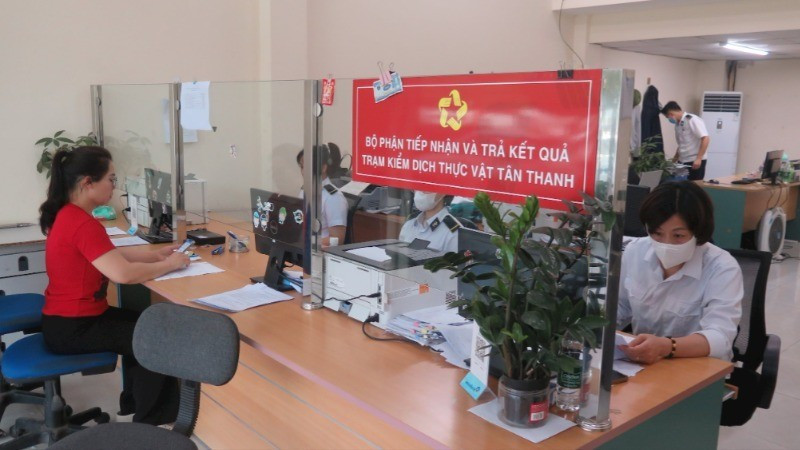Customs clearance facilitates agricultural product exports at border gates
Many of the nation’s key agricultural products are currently entering their peak harvest season, such as lychee, durian, longan, mango, and dragon fruit. Therefore, relevant authorities and localities need to implement timely and effective measures to avoid the situation of having “bumper crops but falling prices”, supply-demand imbalance, and congestion of goods at border gates.

In Official Dispatch No. 79/CD-TTg (dated May 31, 2025) on proactively implementing measures to ensure the production, processing, consumption, and export of agricultural products, the prime minister also requested that the Ministry of Finance direct customs forces to devise specific plans to facilitate and prioritise the fastest possible customs clearance for fresh agricultural exports.
Establishing dedicated channels for agricultural products
Deputy Head of Customs Sub-department Region VI (Lang Son, Cao Bang), Vi Cong Tuong, said that import-export activities at border gates in Lang Son Province from early 2025 until now have shown an increasing trend. As of June 4, approximately 214,000 vehicles transporting goods have cleared customs at border gates, a 23% increase compared to the same period last year, involving over 3,500 enterprises engaged in import-export through the area.
The total import-export turnover through Lang Son’s border gates has reached nearly 33.1 billion USD, a 34% rise compared to last year. Notably, agricultural products are among the items cleared in large quantities.
Nong Quang Hung, Deputy Chief of Customs at the Tan Thanh and Van Lang border gates (Lang Son), shared that Tan Thanh is the largest agricultural product import-export gateway in the province. Recently, customs forces at the border have consistently created favourable conditions for businesses importing and exporting through the gate. Agricultural products such as durian, jackfruit, and mango are all exported within the same day. For durian in particular, Tan Thanh customs processes over 500 tonnes daily, equivalent to 50 trucks.
Regarding lychee, the border gate has recently received 3 to 5 trucks per day for export. It is forecast that during the lychee peak season, the number of trucks will increase significantly. To ensure trucks can export within the same day without congestion, Tan Thanh customs has implemented a priority dedicated channel for lychee exports and expanded the receiving yard to accommodate 200 lychee trucks daily. Currently, it takes only 10 minutes from the time the truck arrives to the completion of customs paperwork before the goods are exported.
Meanwhile, Kim Thanh International Road Border Gate II (Lao Cai Province) has also introduced several measures to support smooth lychee exports to China, such as separate lanes for vehicles carrying lychee and priority access through dedicated inspection gates for faster export clearance.
According to the Ministry of Agriculture and Environment, this year’s total lychee production nationwide is estimated at approximately 303,000 tonnes, a 30% increase from 2024, requiring special attention regarding consumption. Although Vietnamese fresh lychee have been exported to over 20 countries worldwide, China remains the key market, accounting for up to 90% of exports. Thus, fast and effective customs clearance at border gates plays a crucial role in ensuring goods flow smoothly and maintaining product freshness.
Meeting requirements and standards of import markets
Phung Duc Tien, Deputy Minister of Agriculture and Environment, noted that recently the ministry’s leadership held direct discussions with China’s General Administration of Customs regarding issues related to agricultural exports to this market. Both sides agreed to strengthen customs clearance capacity and quality inspections at border gates, ready to extend working hours to expedite clearance and reduce congestion, especially for items entering their peak harvest season.
For fresh lychee, the Department of Crop Production and Plant Protection (Ministry of Agriculture and Environment) has assigned staff to be on duty 24/7 at border gates and testing laboratories to facilitate rapid phytosanitary procedures before export.
In addition, the Customs Department has issued directives requiring regional customs offices to instruct subordinate units to prioritise immediate clearance for exports of agricultural, forestry, and aquatic products, particularly those at peak harvest. They also regularly update and promptly provide information on import policies and tariff regulations of foreign countries to exporters at border gates.
Hoang Khanh Duy, Deputy Head of the Dong Dang-Lang Son Border Economic Zone Management Board, affirmed: “The consistent policy of Lang Son Province’s leadership is to always create the most favourable and transparent conditions for businesses exporting agricultural products. Lang Son has proactively negotiated and held talks with the Guangxi (China) authorities to agree on plans to enhance import-export customs clearance capacity, especially by exchanging content to facilitate the smooth clearance of fresh fruit exports from Viet Nam.”
However, to ensure smooth export operations, the management board also recommends localities continue advising exporters and traders to proactively conduct exports via official channels, with clear sales contracts to reduce risks. Attention should also be paid to quality and food safety, meeting China’s requirements for traceability, planting area codes, and packaging facility codes.
Sharing this view, Mai Xuan Thin, General Director of Red Dragon Production-Trade-Service Co., Ltd., said that China has very strict controls on food safety and has strengthened communication about the quality of imported agricultural products, helping to build trust among domestic consumers. Therefore, when Viet Nam ensures technical standards and meets regulations on pesticide residue and heavy metals, Chinese consumers will certainly strongly support Vietnamese agricultural products.








